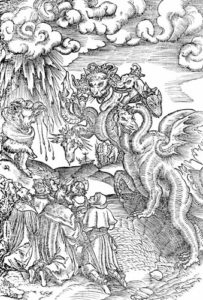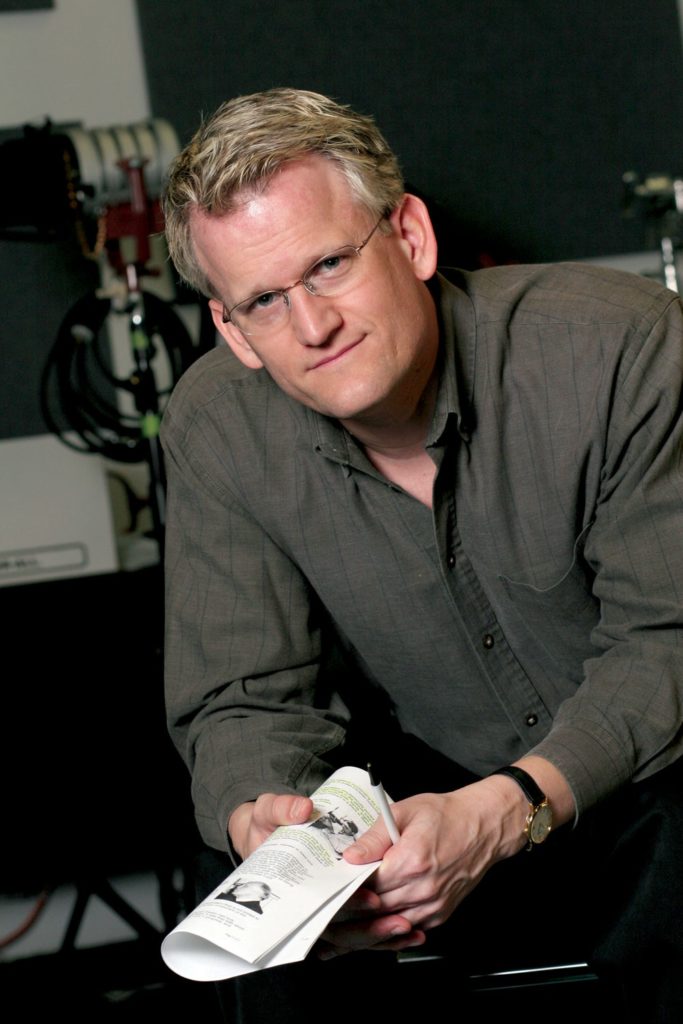An Apologetic Of Horror, Part 1
Horror is not an inherently evil genre of storytelling. It can be used for gratuitous evil purposes, or for godly moral purposes. The Bible tells many stories using the horror genre in order to inspire holy fear of evil and admonish or chastise those in sin. Horror movies can be biblically redeeming in three ways. First, horror can reinforce the doctrine of humanity’s sinful nature and its consequences. Monsters become metaphors for wickedness suppressed in unrighteousness and its outcome (Rom. 1:18). Second, horror can illustrate the consequences of modernism’s humanistic and scientific hubris. When humans play “god” in science or knowledge, they are blind to the true nature of evil and therefore reap their own destruction (Gal. 6:7–8). Third, horror can be a prophetic social commentary on the sins of society. We are revealed to be no different than zombies, bloodsuckers, and other monsters in our social injustice and cultural degeneracy.
When one thinks of horror movies, the usual images conjured up in the mind are of nubile coeds being lured to isolated locations for the purpose of having sex and then being murdered and carved up in ever innovative and disgusting new ways by a grotesque chimera or phantasm. Likewise, for thriller movies, images that stalk the mind are of innocent men or women being hunted by maniacal serial murderers as a relentless feast of fear and gore for the audience.
Though these repulsive clichés have become the norm for many Hollywood horror and thriller films, they are not the only approach to the genres. In fact, in today’s postmodern society so saturated with relative morality, horror and thriller stories have the ability to be an effective apologetic for the Christian worldview.
Some well-meaning cultural crusaders make claims that horror is an intrinsically evil genre that is not appropriate for Christians to create or enjoy. They believe horror is an unbiblical genre of storytelling. One writer argues, “Horror is an example of a genre which was conceived in rebellion. It is based on a fascination with ungodly fear. It should not be imitated, propagated, or encouraged. It cannot be redeemed because it is presuppositionally at war with God.”(1) Evidently, God disagrees with such religious critics because God himself told horror stories thousands of years before Stephen King or Wes Craven were even born.
 The prophet Daniel wrote horror literature, based on images and drama pitched by God to him in Babylon. Not only did God turn the blaspheming king Nebuchadnezzar into an insane wolfman to humble his idolatrous pride (Dan. 4), but He storyboarded horror epics for kings Belshazzar and Darius as allegories of the historical battle between good and evil to come. Huge hybrid carnivorous monsters come out of the sea like Godzilla, one of them with large fangs and ravishing claws to devour, crush, and trample over the earth (Dan. 7:1–8) until it is slain and its flesh roasted in fire (Dan. 7:11); there are blasphemous sacrileges causing horror (Dan. 8:13), including an abomination of desolation (Dan. 9:26–27); angels and demons engaging in spiritual warfare (Dan. 10:13); rivers of fire (Dan. 7:10); deep impact comets and meteors colliding with the earth, Armageddon style (Dan. 8:10); wars, desolation, and complete destruction (Dan. 9:26-27). The book of Daniel reads like God’s own horror film festival.
The prophet Daniel wrote horror literature, based on images and drama pitched by God to him in Babylon. Not only did God turn the blaspheming king Nebuchadnezzar into an insane wolfman to humble his idolatrous pride (Dan. 4), but He storyboarded horror epics for kings Belshazzar and Darius as allegories of the historical battle between good and evil to come. Huge hybrid carnivorous monsters come out of the sea like Godzilla, one of them with large fangs and ravishing claws to devour, crush, and trample over the earth (Dan. 7:1–8) until it is slain and its flesh roasted in fire (Dan. 7:11); there are blasphemous sacrileges causing horror (Dan. 8:13), including an abomination of desolation (Dan. 9:26–27); angels and demons engaging in spiritual warfare (Dan. 10:13); rivers of fire (Dan. 7:10); deep impact comets and meteors colliding with the earth, Armageddon style (Dan. 8:10); wars, desolation, and complete destruction (Dan. 9:26-27). The book of Daniel reads like God’s own horror film festival.
It is not merely the human being Daniel who crafted this work of epic horror allegory, it is God Himself who rolled the camera and directed the action. God himself enjoys the horror genre. That’s God-breathed inerrancy. The author of this faith didn’t grow out of it after the Old Testament. In fact, he may have received an even harsher movie rating in his later production, the New Testament.
 The book of Revelation is an epic horror fantasy sequel to Daniel, complete with science fiction special effects, and spectacles of horror darker than anything in a David Cronenberg Grand Guignol theater of blood. In this apocalyptic prophecy we read of a huge demonic spectacle of genetically mutated monsters chasing and tormenting screaming people (Rev. 9:1–11); armies of bizarre beasts wreaking death and destruction on the masses (Rev. 9:13–18); a demonic dragon chasing a woman with the intent to eat her child (Rev. 12:3–4); a seven-headed amphibious Hydra with horns that blasphemes God and draws pagan idol worship from everyone on earth (Rev. 13:1–10), massive famines (Rev. 6:8); gross outbreaks of rotting sores covering people’s bodies (Rev. 16:2); plagues of demonic insects torturing populations (Rev. 9:1–11); fire-breathing Griffon-like creatures (Rev. 9:17); supernatural warfare of angels and demons (Rev. 12:7); the dragging of rotting corpses through the streets while people party over them (Rev. 11:7–13); rivers and seas of blood (Rev. 14:20; Rev. 16:3); a blaspheming harlot doing the deed with kings and merchants (Rev. 17:1-5) who then turn on her, strip her naked, burn her with fire, and cannibalize her (Rev. 17:16); more famines, pestilence and plagues (Rev. 18:8); and when the good guys win, there is a mighty feast of vultures scavenging the flesh of kings and commanders in victory (Rev. 19:17–18). And I might add, this all gives glory to God in the highest.
The book of Revelation is an epic horror fantasy sequel to Daniel, complete with science fiction special effects, and spectacles of horror darker than anything in a David Cronenberg Grand Guignol theater of blood. In this apocalyptic prophecy we read of a huge demonic spectacle of genetically mutated monsters chasing and tormenting screaming people (Rev. 9:1–11); armies of bizarre beasts wreaking death and destruction on the masses (Rev. 9:13–18); a demonic dragon chasing a woman with the intent to eat her child (Rev. 12:3–4); a seven-headed amphibious Hydra with horns that blasphemes God and draws pagan idol worship from everyone on earth (Rev. 13:1–10), massive famines (Rev. 6:8); gross outbreaks of rotting sores covering people’s bodies (Rev. 16:2); plagues of demonic insects torturing populations (Rev. 9:1–11); fire-breathing Griffon-like creatures (Rev. 9:17); supernatural warfare of angels and demons (Rev. 12:7); the dragging of rotting corpses through the streets while people party over them (Rev. 11:7–13); rivers and seas of blood (Rev. 14:20; Rev. 16:3); a blaspheming harlot doing the deed with kings and merchants (Rev. 17:1-5) who then turn on her, strip her naked, burn her with fire, and cannibalize her (Rev. 17:16); more famines, pestilence and plagues (Rev. 18:8); and when the good guys win, there is a mighty feast of vultures scavenging the flesh of kings and commanders in victory (Rev. 19:17–18). And I might add, this all gives glory to God in the highest.
The apocalyptic genre that was used by the prophets and apostles of God relied heavily on images of horror to solicit holy fear of sin and its consequences in their audience and point them to God. Horror and thriller movies (and by extension, other forms of horror storytelling or image-making) can accomplish this same “prophetic” redemptive task several ways.
ORIGINAL SIN CROUCHING AT THE DOOR
 First, horror can be redemptive by reinforcing the doctrine of man’s sinful nature. Gothic storytelling prides itself on exploiting man’s fear of his dark side through vampires, werewolves, and other half-man/half-monsters. These freaks of nature or supernature personify the cultured, educated man by day and the unbridled beast by night. They represent the gospel truth that our evil nature avoids the light, lest its deeds be exposed (John 3:20), and that true evil is done by otherwise “normal” people who suppress the truth about themselves in unrighteousness (Rom. 3:18–21). We are Jekylls and Hydes, all.
First, horror can be redemptive by reinforcing the doctrine of man’s sinful nature. Gothic storytelling prides itself on exploiting man’s fear of his dark side through vampires, werewolves, and other half-man/half-monsters. These freaks of nature or supernature personify the cultured, educated man by day and the unbridled beast by night. They represent the gospel truth that our evil nature avoids the light, lest its deeds be exposed (John 3:20), and that true evil is done by otherwise “normal” people who suppress the truth about themselves in unrighteousness (Rom. 3:18–21). We are Jekylls and Hydes, all.
The Victorian era provided western culture with a rich and lasting heritage of Christian metaphors for the depraved side of human nature that requires restraint. Those metaphors have been resurrected in some modern films with equal moral vision. Dracula symbolized the struggle of the repressed dark side and its eternal hunger and need for redemption, which is explored with modern fervor in Interview with the Vampire and Dracula 2000(2). Dr. Jekyll fought to suppress the increasing inhumanity of his depraved alter ego, Mr. Hyde, just like Jack has to defeat his destructive inner self, Tyler, in Fight Club. Victor Frankenstein’s scientific hubris leads to a vengeful monster in the same way that the conceit of scientists without moral restraint leads to the takeover of Jurassic Park by unpredictable dinosaurs. The corrupted conscience of H.G. Wells’s invisible man getting away with crime is revisited in the more recent Hollow Man.
One movie, The Addiction, uses the vampire genre as a metaphor for the addictive sinful nature of humanity. The vampires spout human philosophy as they kill their victims, attempting to prove there is no moral authority to condemn what they do. One of them even concedes R.C. Sproul’s theological point, that, “we’re not sinners because we sin, we sin because we are sinners.” One victim is shocked at being bitten by her friend. She anxiously blurts out, “How could you do this? Doesn’t it affect you? How can you do this to me?” To which her vampiress friend sardonically replies, “It was your decision. Your friend Feuerbach said that all men counting stars are equivalent in every way to God. My indifference is not the concern here. It’s your astonishment that needs study.” This reversal is an apologetic argument against unbelief, par excellence. If God is dead, as the modern secular mindset proposes, and man is his own deity, creating his own morality, then no one should be surprised when people create their own morality by feasting on the blood of others. Without God, there is no such thing as “evil.” In the end, the vampiress, believe it or not, has a Catholic conversion! This film embodies the argument for God’s existence through the existence of evil.(3)
(1) Doug Phillips, Doug’s Blog, November 1, 2006, “The Horror Genre,” http://www.visionforum.com/hottopics/blogs/dwp/2006/11/1878.aspx.
(2) The unique twist in Dracula 2000 is in its depiction of Dracula’s origins. Dracula is revealed to be the undead soul of Judas Iscariot prowling the earth in vengeance against his own perdition. This story contains strong Christian metaphors: Dracula/Judas’s insatiable lust for blood is a symbol of the eternal need for Christ’s blood of forgiveness; the silver abhorrence, a reflection of the thirty pieces Judas betrayed Christ for, and of course, crosses and wooden stakes through the heart, elements of the power of the cross of Christ to destroy evil. Dracula 2000 resurrects Christian elements that have been buried by many contemporary vampire movies.
(3) Another vampire film that warns of the subtle and seductive nature of sin is Let the Right One In, a story of a young boy befriending a young girl who happens to be a vampire.
 Brian Godawa is the screenwriter for the award-winning feature film, To End All Wars, starring Kiefer Sutherland and Alleged, starring Brian Dennehy as Clarence Darrow and Fred Thompson as William Jennings Bryan. He previously adapted to film the best-selling supernatural horror novel The Visitation by author Frank Peretti for Ralph Winter (X-Men, Wolverine).
Brian Godawa is the screenwriter for the award-winning feature film, To End All Wars, starring Kiefer Sutherland and Alleged, starring Brian Dennehy as Clarence Darrow and Fred Thompson as William Jennings Bryan. He previously adapted to film the best-selling supernatural horror novel The Visitation by author Frank Peretti for Ralph Winter (X-Men, Wolverine).
His book, Hollywood Worldviews: Watching Films with Wisdom and Discernment has been released in a revised edition from InterVarsity Press. His new book Word Pictures: Knowing God Through Story and Imagination (IVP) addresses the power of image and story in the pages of the Bible to transform the Christian life.
His new Biblical Fantasy novel, Noah Primeval will be released in early 2012. Visit his web sites to read sample chapters and learn more about Brian.









































Thanks for this article! I’ve often wondered what Christians should think of the horror genre.
I’m not a fan of hack ’em up slasher flicks, but I do like thrillers and some of the horror monsters, like werewolves. I’ve often thought that horror portrays sin and redemption in much clearer terms than other genres, because evil is raw and in your face, and redemption is a complex thing sought after by the people who have been bitten/cursed/whatever.
I know Dekker delves into horror, but I don’t like his as much because he seems to have this junior high obsession with ‘gross’, throwing worms and eating boogers. Psychological thrillers are what scare the heck out of me, like Turn of the Screw by Henry James, or even The Oath by Peretti. (I can’t read that book without checking in the mirror to see if I have the mark over my heart.)
Bram Stoker’s Dracula, on the other hand, is more Christian than most modern Christian novels. When Mina is bitten, she’s praying and pleading with God for forgiveness, and even Dracula is redeemed at the end by being finally killed, because death released him from his awful vampiric curse.
Dekker doesn’t really write horror but his books are plenty psychological in their focus. I’ve never read a book of his where people eat boogers and throw worms and I’ve read all of his books so far (save his joint effort with Tosca Lee). So I really don’t understand what you mean. I loved and still love The Oath. It’s an intense, reflective story of the nature of sin. Bram Stoker’s Dracula was also very good.
The bat larvae being “worms” and the bad guys doing gross things like Marsuvees Black eating the wart he’s just miraculously removed. One bat spitting into the mouth of another bat. You know, things “just to be gross”. Dekker even said that he writes half that stuff to gross out his mother-in-law. :-p
Haha. I think it’s mostly Marsuvees who does that stuff. And he’s a freak.
Doctor Who verges on horror quite frequently–and part of the attraction of that in my mind is that I know it will end “well.” So I can be scared and still feel somewhat safe.
I think the only serious problem with horror is when it lowers the value of human life repeatedly killing people. Horror can be achieved by the threat of death as much by death itself.
Thanks for highlight reel. I had entirely forgotten about Hollow Man, and never heard of The Addiction. Great piece.
I agree. When it becomes all about seeing new ways of killing people then you enter into exploitation. A fine line between exploitation and exposure though. I have been writing a script about Jezebel and Iron Age Israel, and God makes a moral point at the end of Omride dynasty by finishing it off in a bloodbath akin to The Godfather or Scarface. And in Judges, the point of showing the grotesque is to make the point of illustrating what we become when “every man does what is right in his own eyes.”
I’ve always been struck by how moral horror stories usually are, despite the horrific things that happen along the way. Good and evil are clearly identified (almost to the point of caricature), characters are most often undone or made vulnerable to the forces of evil via their own moral or spiritual flaws, and evil is vanquished by good at the end, most of the time, or at least thoroughly beaten-down for a while. Some examples from Stephen King’s portfolio: The Stand, and It.
Horror stories that fail for me violate that basic structure. Characters are killed off randomly, evil is portrayed as more powerful than good, and/or evil wins in the end, with no hope left to the reader/viewer that this is a temporary situation. Stephen King examples: Pet Cemetary, and Children of the Corn.
Thanks, Fred. I’m a bit weird about horror, not because I’m squeamish, but because I refuse to slog through pointless, grotesque muck for no reason. (That, and apparently most of what I’ve been exposed to is the kind rather lacking just in storytelling quality.) Examples: I’m sorry, but I shouldn’t be able to say the line before the actor does in a movie I haven’t seen (The Grudge) or predict every infinitely stupid move the characters make from scene one (The Strangers); or get to the last scene feeling completely cheated of two hours (The Strangers; The Ring).
Interview with a Vampire disturbed me, but I appreciated the overall desire for redemption. I’ve seen two Dracula movies…but overall, my issue with vampire books is still that I’m not into the sexual violence combination. (I don’t know if the Dracula book does or not; haven’t read it.) The exceptions to that, I usually enjoy.
Anyway, to Mr. Godawa and others who provided suggestions: Thanks. Now I have a nice list to browse through. 0=)
Kaci,
Yes, there are certainly many wasteful horror movies with bad predictable elements. But there are also those same problems with romantic comedies, fantasies, dramas, and all genres. Unfortunately, we have to wade through a lot of crap to find the gems in every genre.
I would suggest that the Twilight series is a great antidote to the usual sexual violence combo in vampire movies. The theme is a metaphor for abstinence and our sinful nature, the original purpose of the vampire mytholgy.
Brian, and in turn Twilight substitutes sexual violence for abuse ‘relationships’ and terrible writing.
Brian, sorry I missed this before.
I agree. I have a short-list of vampire novels I really enjoyed. As far as horror goes, I really think for the most part I haven’t been exposed to the good stuff, movie-wise.
Your right, Revelation is one of the best horror stories ever written!
Spam alert.
And the spam has been slayed. (Must have gotten through a wider gap in our spam filter’s wire mesh.)
[…] nature [see Christopher Miller's recent post "Writers Slay Dragons (and you should too)"]. In his apologetic of horror, guest blogger Brian Godawa said, ” Monsters become metaphors for wickedness suppressed in […]
[…] the horror genre of fiction. I’m thinking of articles by Brian Godowa (a series existing of Parts 1, 2, and 3), Mike Duran (such as this article, this one, and this), R.L Copple (in this, this, and […]